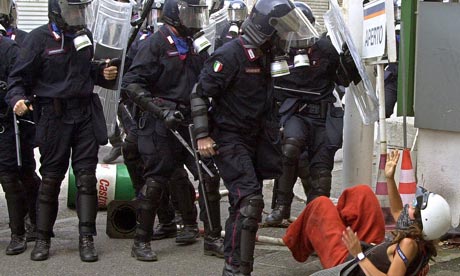
It was with understandable trepidation that Mark Covell travelled from his council flat to Rome last week for a preview of the film that dramatises the night he was savagely beaten and left in a coma by Italian police.
The film, Diaz – Don't Clean Up This Blood, which premieres on Sunday at the Berlin film festival – is the first portrayal of the horrific assault by police on activists attending the Genoa G8 summit in 2001 and comes as the Italian government finally negotiates damages for Covell, who was left with eight broken ribs, a mouthful of smashed teeth and a damaged lung.
"It was surreal and emotional to see myself in a coma, splattered with blood," said Covell, 44, who has ceaselessly campaigned for his aggressors to be jailed. "It took me back a decade."
A London bike courier turned activist and journalist, Covell was among the 87 protesters wounded when police baton-charged the Diaz school in Genoa, beating people as they cowered in their sleeping bags and planting petrol bombs to justify the raid.
Officers had decided – wrongly – that members of the Black Bloc protest movement who had fought with police and devastated shops and banks in Genoa during the G8 meeting were hiding out at the school. Once arrested, protesters, including five Britons, were taken to a police barracks where they were beaten again, sprayed with asphyxiating gas, threatened with rape and forced to sing fascist-era songs.
Despite the handing out of verdicts including convictions for grievous bodily harm and falsifying evidence in two major trials, Italy's tardy justice system has ensured final appeals are yet to be heard and most sentences have been timed out by the statute of limitations. "No one has ever been arrested or gone to jail," said Massimo Pastore, a lawyer who has represented Covell and other activists.
Prematurely grey-haired with hollow cheeks, Covell lives on £400 a month in benefits and still feels pain from his injuries. But, "for the first time in 10 years", he was smiling last week as the Italian government finally started talks over compensation.
That those discussions are happening has much to do with the ousting last November of Silvio Berlusconi, who took office weeks before the G8 summit in July 2001, said Lavinia Botto, a lawyer handling Covell's claim. "Berlusconi's government never bothered with this question," she said.
Until now the violence in Genoa was also taboo for Italian film-makers, said Domenico Procacci, the producer who dug into his own pocket to make Diaz as well as finding funds in France and Romania. "This was a story no one in Italy wanted to tell," he added.
Critics in Berlin may be shocked by the events in the film, but director Daniele Vicari has made no excuses. "Just reading the evidence given in the trials provoked the same terror in me as a horror film," he said.
Covell was standing in the street outside the school as hundreds of masked officers in riot helmets massed for the raid. When he told police he was a journalist, he recalled in court, they replied: "You are not a journalist, you are Black Bloc and we massacre Black Bloc." They then beat him with riot shields and kicked him "like a football" on the ground until he was unconscious, laughing as they did so.
"Mark has looked death in the face and is still trying to get his life back," said Vicari. "You lose your dignity when someone tries to kill you and he has been trying to tell the world since about an attack which people find hard to believe. To fail in that is like facing death again."
Not all the police are portrayed as villains in the film. One character is based on Michelangelo Fournier, who condemned the raid as a "Mexican slaughterhouse". "Inside the school he said 'enough' and took his helmet off," said Vicari. "He was then judged a traitor by colleagues."
If his compensation comes through, Covell said he is thinking of emigrating to New Zealand to live in a "house with a view of the Pacific".
"It is weird being double-kissed and thanked by Italians who see me as an activist hero," said Covell, who has supplied video footage for a documentary about the G8 which will also be screened at Berlin. "But if we campaigned to cut out a cancerous core in the Italian police, I feel we have not achieved that."
He pointed out that, despite their convictions, officers who were on the scene that night have risen through the ranks as their sentences were nullified by the statute of limitations. Judges said it was difficult to believe that one officer, Francesco Gratteri, who was in the street outside the school, did not witness Covell's beating. Gratteri is now head of the Italian police's national criminal investigation unit.
"No one has ever said sorry," said Procacci.

